
Table of Contents
The Medical School Admission Requirements (MSAR) is a comprehensive resource provided by the Association of American Medical Colleges (AAMC) and is typically updated every April. It offers details on all accredited medical schools in the US and Canada, including:
- Coursework prerequisites
- Median MCAT of matriculants
- Median GPA of matriculants
- Acceptance rates
- Curriculum
- Tuition
MSAR is essential to helping you know which medical schools you can and should apply to. Every American and Canadian medical school has different admission requirements, and MSAR helps you make an exportable school profile list to keep it all straight.
Most medical students apply to 15-20 med schools, and the MSAR helps simplify the application process. This guide walks you through the MSAR basics and how to make a medical school list, boosting your chances of acceptance. You can also watch our video about making a medical school list.
Before Applying, Check Prerequisites
Before you even begin the long application process, make sure you’ve completed all necessary prerequisites for medical school. These prerequisites vary from school to school, but below are some common requirements:
- Specific coursework
- Clinical experience
- A solid GPA (you can increase GPA with a post-bacc, if necessary)
- A solid MCAT score
Also, before you invest in MSAR, know that the MSAR database only shows allopathic medical schools (MD-granting programs). If you want to explore osteopathic medical schools (DO-granting programs), use AACOM’s Choose DO Explorer.
Read Next: Easiest Medical Schools to Get Into
Cost and Subscription
A one-year subscription to MSAR costs $28, and two years costs $36 on the AAMC website. The medical school application process costs a lot of money, but MSAR is a drop in the bucket by comparison.
There are both free features available to everyone with an AAMC account and paid features of the MSAR available only to subscription holders.
| Free MSAR Features | Paid MSAR Features |
| A few basic stats (i.e., application deadlines) | MCAT & GPA ranges for accepted students to compare your statistics to the average matriculant |
| Admissions contact details | Tuition and financial aid information |
| Mission statements | Prerequisite course requirements |
| General info about US/Canada medical schools | Detailed admissions statistics (i.e., in-state vs. out-of-state, interview rates, etc.) |
| Class profiles (i.e., demographics, backgrounds of accepted students, etc.) |
If you want a detailed overview of different schools’ admission requirements, the MSAR may be a worthwhile investment. However, if you’re not ready to commit to the medical school application process, the MSAR cost may not be justified. Instead, consider a free resource, like MedSchool Explorer.
AAMC offers a Fee Assistance Program for eligible students to cover application costs, including complimentary access to MSAR.
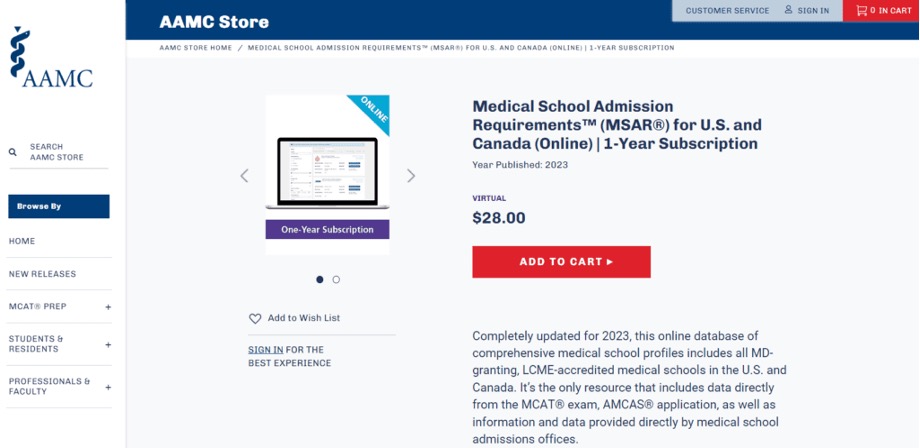
Information the MSAR Provides
The MSAR provides information about a wide range of topics related to medical schools, including:
- School overview: The MSAR has general information (not requiring a subscription) about each MD school’s contact information, social media, first-year class size, and mission statement — a valuable nugget you can tie into your upcoming personal statement.
- GPA & MCAT scores: The MSAR shows the range of GPA and MCAT scores of accepted applicants to US and Canada medical schools, allowing you to compare your own scores to successful applicants.
- Prerequisite coursework: The MSAR includes information about the coursework required for admission to each medical school, including the number of courses in specific subjects like biology and chemistry.
- Application process: The MSAR provides details about each medical school’s application process, including required materials, interviews, submission deadlines, selection criteria, and waitlist information.
- Curriculum: The MSAR shows you the curriculum for each medical school, including the length of different degree programs, the number of clinical rotations, research opportunities, and required courses.
- Tuition and financial aid: The MSAR has info on the in-state/out-of-state tuition and fees for each medical school, as well as the types of financial aid available.
- Residency placement: The MSAR includes data about residency placement rates for each med school, including specialties and locations of the residency programs that students have matched with.
- Demographic info: The MSAR has admissions statistics of the student body at each medical school, including age, gender, and the percentage of students who are international students or from underrepresented minority groups.
- Campus life: Students looking for a certain lifestyle or campus type can find information on the school’s MSAR profile. It includes information about housing, student work-life balance, extracurriculars, and support systems the school has in place.
Ultimate Guide for FREE: How to Complete Your AMCAS Medical School Application
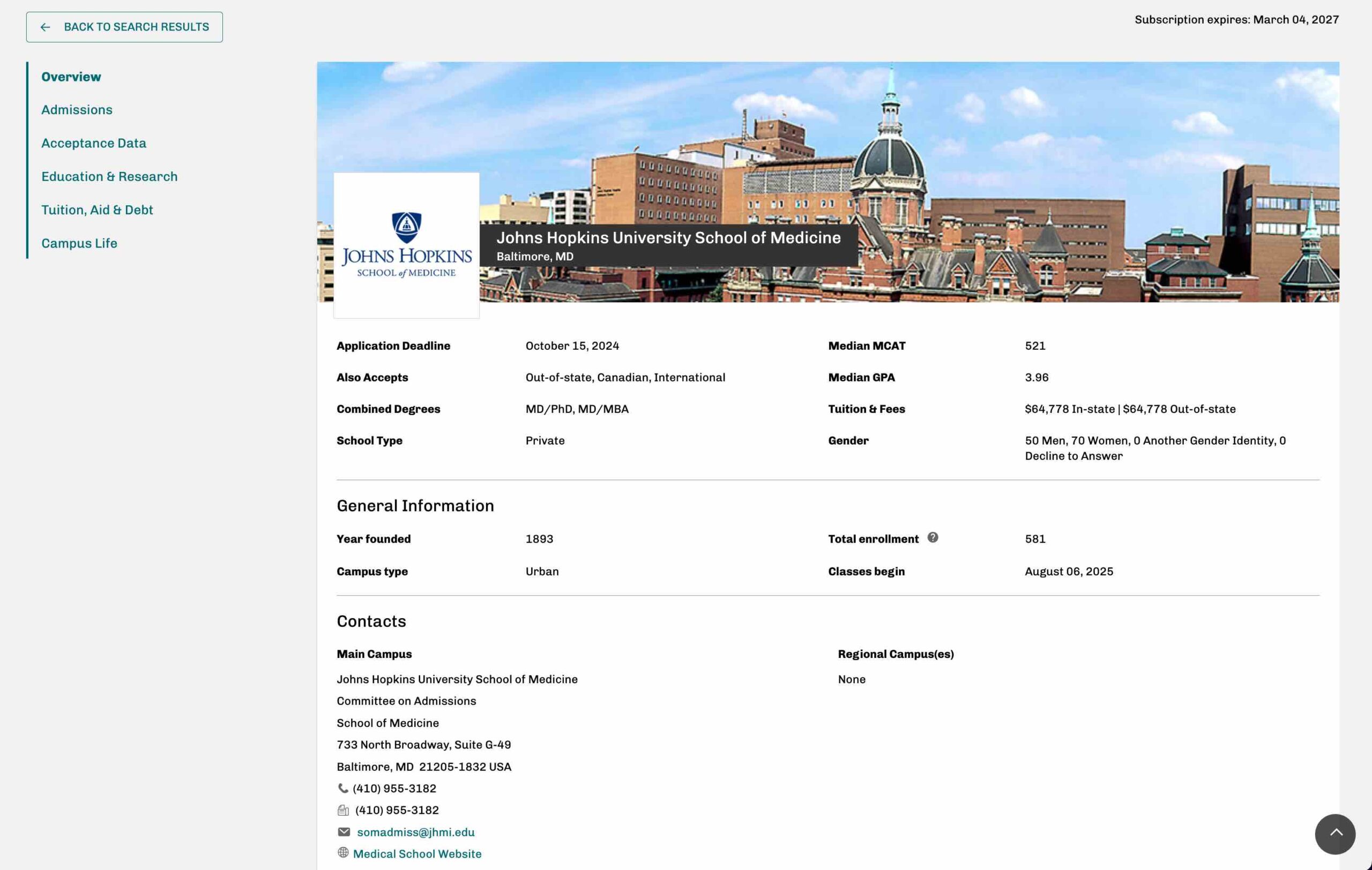
BS/MD and BA/MD Programs
On top of conventional MD programs, the MSAR also includes information about BS/MD and BA/MD programs. These “combined” or “direct” medical programs allow students to complete their undergraduate education and school of medicine education in an accelerated timeline.
To find information about BS/MD or BA/MD programs in the MSAR, search for “combined” or “direct” programs. This will bring up a list of medical schools that offer these types of programs, along with information about the program requirements and application process.
Note: Combined undergraduate/medical programs are highly competitive, and admission is limited to a small number of students.
Considering an MD-PhD Program? Check out this article for how to ace your essay and make it stand out.
Filling Out the MSAR
For your convenience, we separated filling out the MSAR into four steps: entering coursework and scores, comparing and categorizing schools, choosing your schools, and exporting your school list.
Step One: Enter Coursework and Scores
On the “My Coursework & Scores” page, you can input your MCAT and GPA. When you’re reviewing a school, MSAR will automatically show how your scores compare to that school’s matriculant data.
Similarly, you can save your coursework, hours completed, and lab and research experience to see at a glance if you meet the school’s admissions requirements.
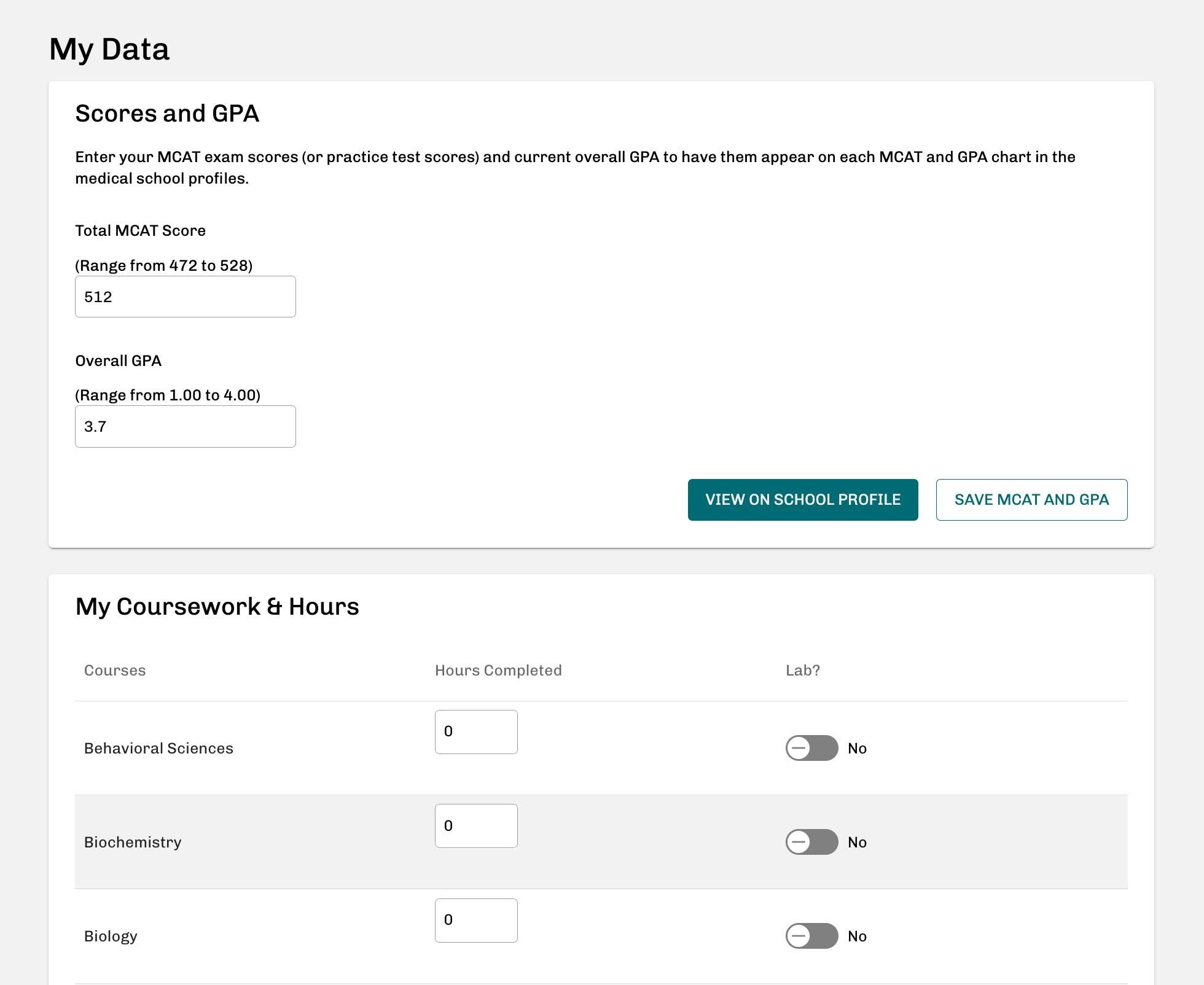
Step Two: Compare and Categorize Schools
The MSAR’s “Compare” functionality gives you a side-by-side comparison of up to 10 schools. If your dream school requires prerequisites you don’t have or a higher matriculant GPA than you got, this will show you what to work on next.
Applying to 1-2 reach schools is a good idea, but prioritize schools where the school’s matriculant GPA and MCAT scores are in line with yours.
Read Next: Should You Apply Early Decision to Medical School?
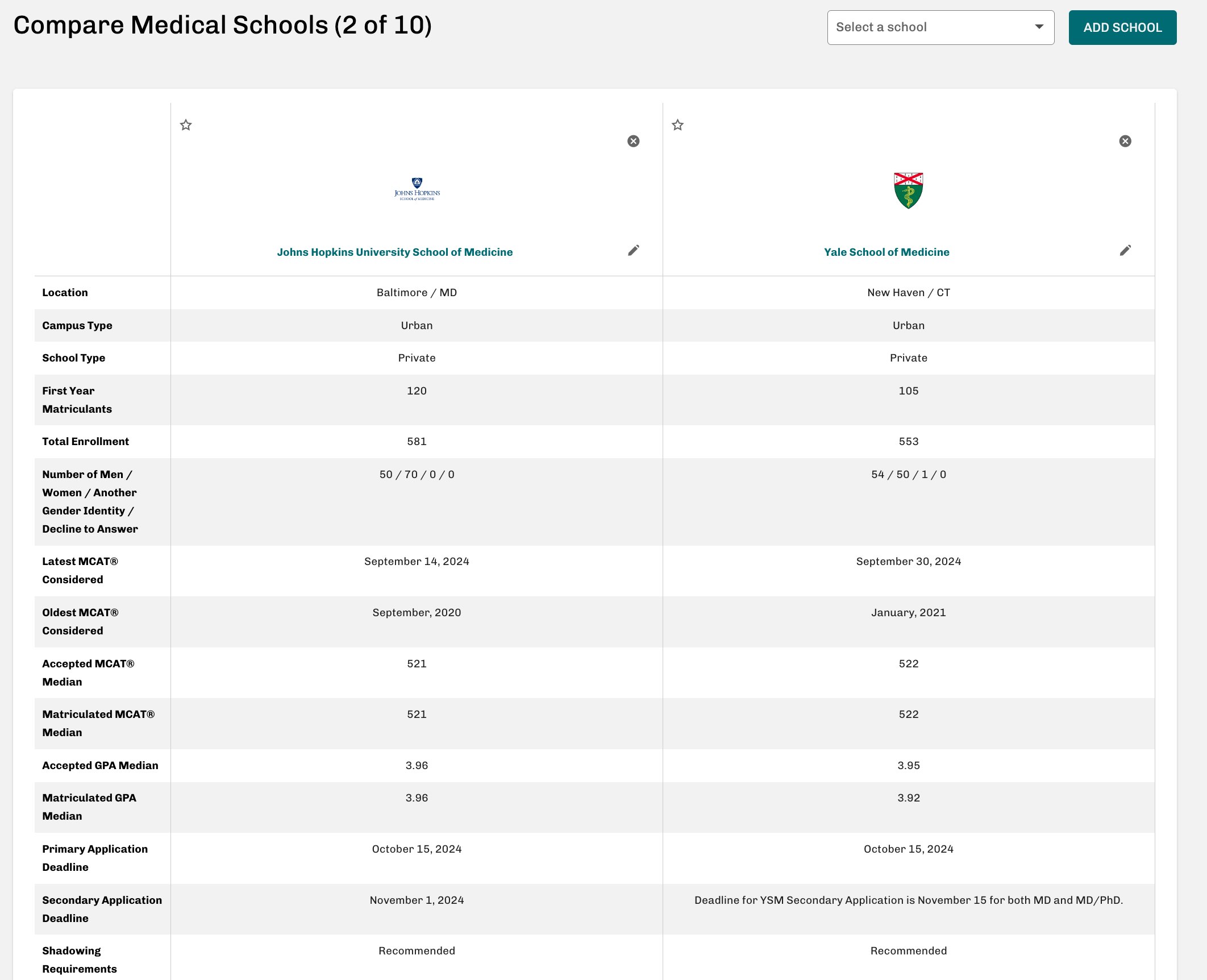
Step Three: Choose Which Schools to Apply To
You’ll find that you’re generally overqualified for certain schools (often called “undershoot” or “safety” schools), underqualified for others (“dream” or “reach” schools), and a perfect fit for some. These sweet spot schools should be your target schools.
Plan to apply to20 or more target schools and 2-4 reach and undershoot schools. There’s nothing wrong with applying to a reach dream school, and there’s nothing wrong with being realistic — considering your grades, your ideal location, tuition and fees, and your personal interests.
Once you’ve done your homework, you can “Favorite” the schools you decide to add to your list and view them from your “My Favorites” page. The “My Favorites” page is where you should start ranking schools to build your med school list.
Applying to medical school can get pricey, which is another factor to consider when building your list. Submitting your application costs $175 plus $45 for each additional school. Secondary applications can also cost hundreds of dollars.
We created a proprietary algorithm to predict your chances of getting into medical school based on more than 50,000 data points and 15,000 real applicants.
The Medical School Chance Predictor uses an algorithm to analyze your GPA, MCAT, and state of residence. It assigns a color-coded category to each medical school so you can quickly see which schools are far undershoot, undershoot, target, reach, or far reach.
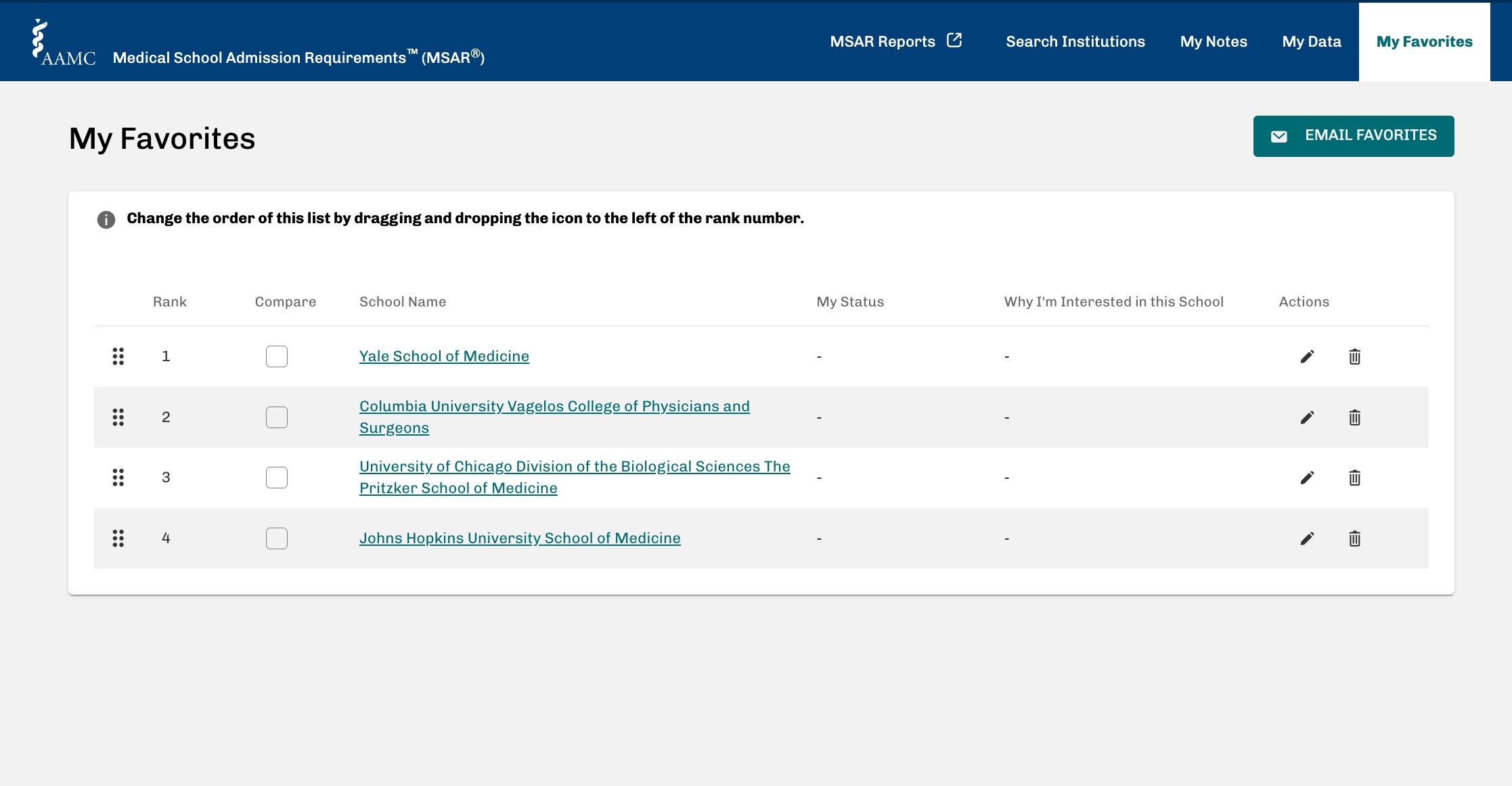
Step Four: Export Your List
Once you create your MSAR school list on the “My Favorites” page, you can export the list into Excel or Google Sheets to manage tasks and track your application status. This optional step can keep you organized over the whole process.
Read Next: The Only Med School Personal Statement Examples You Need to Read
MSAR Alternatives
The MSAR is not the only resource available for finding medical schools. There are a number of other resources you can use to research med schools and find the best fit(s) for you. These MSAR alternatives include:
- AAMC’s Official Guide to Medical School Admissions: This guide, which is produced by the AAMC, contains information about medical schools, including their admission requirements, curriculum, and financial aid options.
- AAMC’s Medical School Search: This tool allows you to search for medical schools based on a variety of criteria, including location, program type, and specialty. It is less detailed than the MSAR.
- AACOM’s Choose DO Explorer: The American Association of Colleges of Osteopathic Medicine (AACOM) offers a database similar to MSAR but for DO programs.
- MedSchool Explorer: This free resource offers the added benefit of “MedSchoolCoach Insights,” snippets from physician advisors associated with various schools. These insights allow students to gain valuable insider knowledge about what makes a school great, what they should be looking for, and how to stand out.
In addition to these MSAR alternatives, you can talk to physician advisors, mentors, and other professionals in the healthcare field to get their perspective on which medical schools might be the best fit for you.
Related Read: Applying to Med School as a Non-Traditional Applicant
Increase Your Chances of Getting Into Medical School
Need a hand finding the right DO or MD program? Our admissions advisors have tons of experience helping pre-med students just like you create a strategic and balanced school list to boost their chances of acceptance.
We also offer complete application advising services, including writing support for your personal statement, interviewprep, and everything you need to be a strong medical school applicant.
Need personalized advice? Let us help with your medical school application — all the way until you get accepted into med school!

Sahil Mehta MD
Dr. Mehta is the founder of MedSchoolCoach and has guided thousands of successful medical school applicants. He is also a practicing physician in Boston where he specializes in vascular and interventional radiology.





